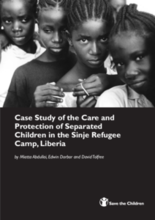This study was a joint initiative between Save the Children UK and Save the Children Alliance. The fieldwork for the study was undertaken during a short and intensive period by two Liberian members of SC UK staff and the CPSC Research Coordinator. Considerable emphasis was placed on the active participation of children and of foster carers throughout the study.
Much of the work with and for separated Sierra Leonean children in the Sinje camps in Liberia results from the initiatives of the refugees themselves, who formed a Child Welfare Committee to undertake a range of child protection functions, and the association of Concerned Carers, a less formal organization of foster carers. Both worked closely in conjunction with the Camp Management Committees. When Save the Children became involved, as partners of UNHCR, they decided to work in close cooperation with these refugee structures. They also helped in the formation of Boys’ Clubs and Girls’ Clubs. As a result of intensive training, empowerment and capacity building which these various groups received from SC UK, they were able to take on the majority of tasks in child protection; these included work with separated children, most of whom had been spontaneously taken in by foster carers, though some were living in self-care arrangements. Young people themselves are playing an unusually active role in child protection within the communities. The role of SC UK staff has evolved to the point where the main emphasis is now on supporting these various community structures and dealing directly only with the most serious protection cases.
Fostering is a widespread phenomenon in Sierra Leone: it is not, however, directed primarily at children who have become accidentally separated from their own families, but rather reflects an arrangement between families which involves the exchange of labour, the provision of discipline, education and training outside of the family, and a complex system of patronage. It was striking to find, in Sinje, that the experience of fostered children ranged, at one end of the spectrum, from a good quality of care and protection and a high level of integration into the foster family, to a neglectful, exploitative and abusive experience at the other. Foster parents seem to be motivated by a range of factors, ranging from a humanitarian or religious concern for children, to a desire to have a child to assist the family in its various domestic and economic activities. It is clear that as a result of the work of the Child Welfare Committee and the Concerned Carers, there has been an overall improvement in the care and protection of fostered children, but that a continuing form of monitoring and support is essential if the needs and rights of separated children are to be met.
©Save the Children

